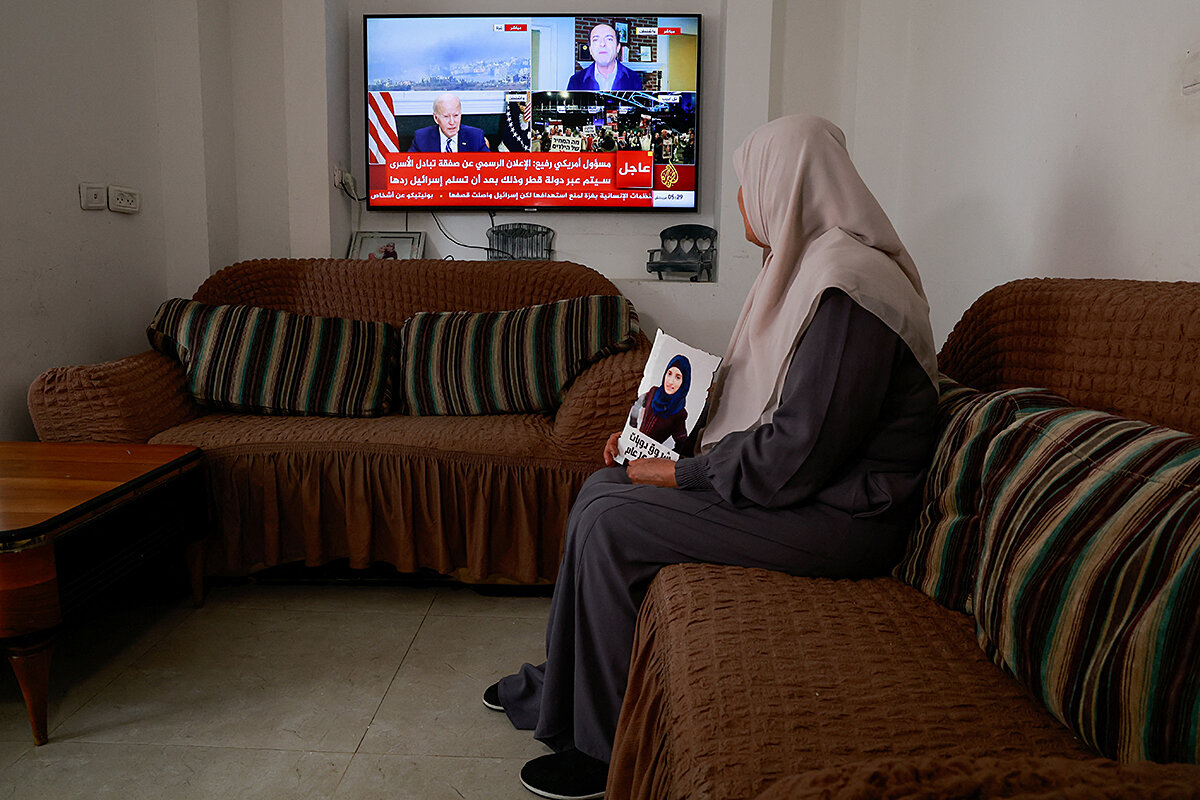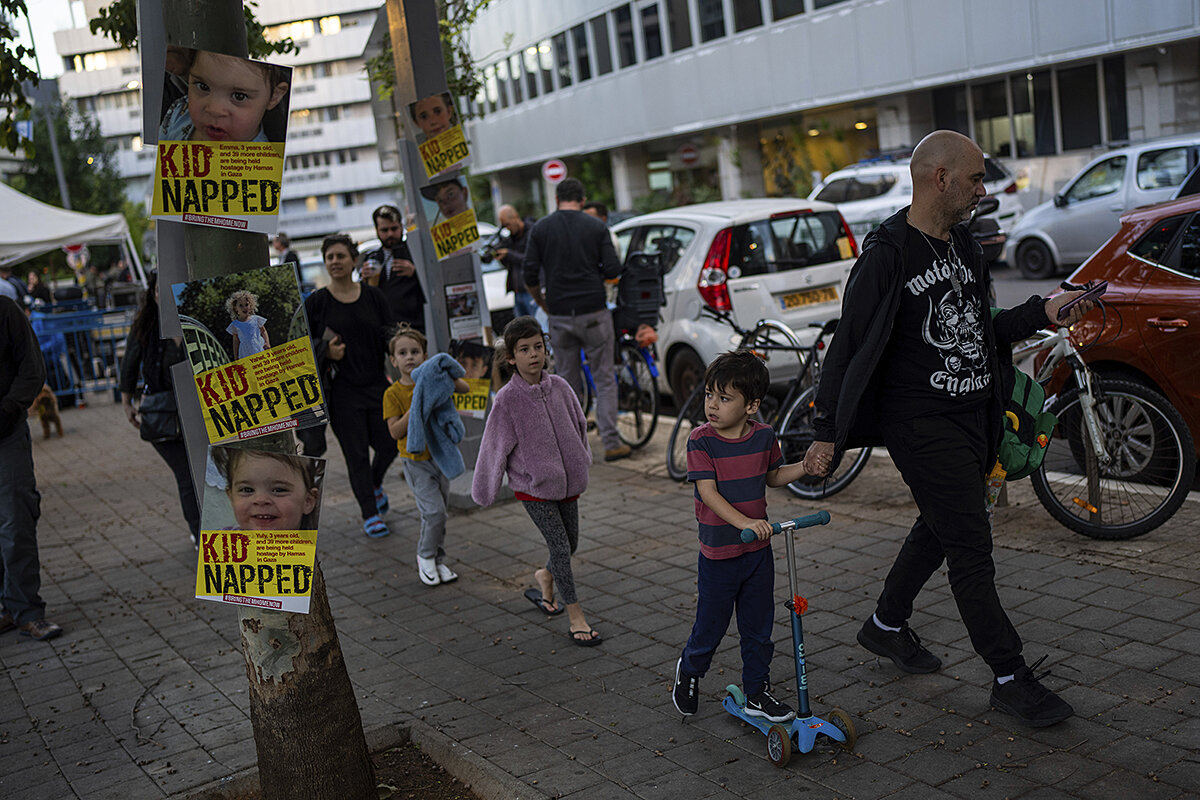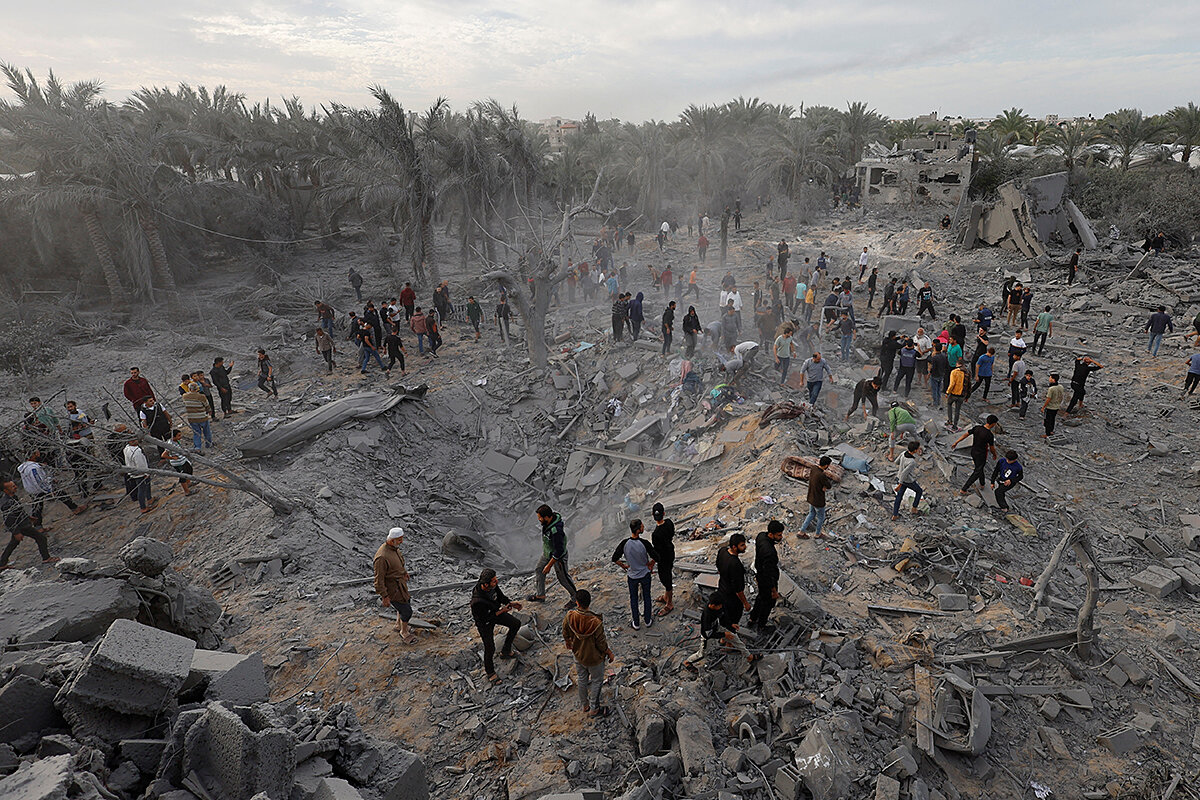Dramatic hostage deal doesn’t erase Israeli view: War only on pause
Loading...
| TEL AVIV, Israel
It’s the most significant diplomatic breakthrough so far in a war that has lasted six weeks and left approximately 14,000 people dead in Gaza and Israel.
Israel and Hamas have agreed on a limited prisoner exchange, a truce for the time that it takes for the swap to happen, and an influx of humanitarian aid and fuel to hard-pressed residents of the Gaza Strip.
Why We Wrote This
A story focused onWednesday saw the first diplomatic breakthrough since the Israel-Hamas war began. Prisoners will be exchanged, and a four-day pause in fighting will allow humanitarian aid into Gaza. But in Israel, there’s no sense the end of the war is close.
Hamas will not free all the 240 hostages whom Hamas fighters kidnapped Oct. 7 – just 50 women and children. But saving even a few dozen hostages is a “moral and ethical duty” in line with Jewish values, Israeli President Isaac Herzog said, which could be a “first step in returning all the hostages home.”
Israel will release 150 Palestinian women and minors held in its jails.
The deal offers only temporary respite for Gaza’s 2.3 million residents, half of whom have been forced to flee their homes by ferocious Israeli missile and artillery fire.
Once the prisoner releases end, “we will continue the war ... until we achieve all our objectives,” Israeli Prime Minister Benjamin Netanyahu told his government this week.
Streets, storefronts, and high-rises across Israel are dotted with their names and faces, along with the ubiquitous tagline, “Bring Them Home.”
Now, at least some of them – the nearly 240 men, women, and children abducted by Hamas in its devastating cross-border assault from Gaza Oct. 7 – may be coming home.
Early Wednesday, after hours of late-night deliberations, the Israeli government approved a deal brokered by Qatar, with input from the United States and Egypt, that would see Hamas release 50 Israeli hostages, all women and children, in return for a four-day “pause” in fighting.
Why We Wrote This
A story focused onWednesday saw the first diplomatic breakthrough since the Israel-Hamas war began. Prisoners will be exchanged, and a four-day pause in fighting will allow humanitarian aid into Gaza. But in Israel, there’s no sense the end of the war is close.
In return, Israel committed to the release of 150 Palestinians – women and minors – being held in its prisons, and to facilitate entry into the battered Gaza Strip of significant amounts of humanitarian aid, including badly needed fuel.
The releases on both sides were set to be carried out in daily installments of some 10 to 12 Israelis and three times that number of Palestinians.
It is the most significant diplomatic breakthrough in a war that has lasted over 46 days, claiming the lives of more than 12,000 Palestinian residents of Gaza and at least 1,200 Israelis. More than 1 million Palestinians have been displaced from the north of the coastal enclave to the south, amid a ferocious Israeli ground invasion and relentless airstrikes that have reduced swaths of the territory to rubble.
According to the terms of the agreement, the option exists for an extension of the truce beyond the initial time frame, with Hamas committing to release 10 hostages for every additional day of nonbelligerence – but only up to 10 days in total. The Iran-backed Hezbollah militia in Lebanon is also expected to abide by the cessation in hostilities.
Despite the deal, implementation of which was set to start Thursday, mistrust between the two sides remains high. The chances are real for a violation and breakdown of the intricate terms agreed upon, analysts caution.
And Israeli officials made clear, even as they were approving its terms, that after the completion of the hostage release they would continue in their twin goals of the destruction of Hamas as a military and governing force in Gaza, and the safe return home of the remaining captives, including several dozen foreign nationals.
“We are at war, and we will continue the war ... until we achieve all our objectives: eliminate Hamas, return all our hostages and missing persons, and ensure that there will be no element in Gaza that threatens Israel,” Israeli Prime Minister Benjamin Netanyahu told his government late Tuesday night.
Internal opposition
The Israeli war cabinet conducting the campaign, along with the country’s security chiefs, had argued in favor of the deal – even at the risk of losing momentum on the battlefield and despite it being only a partial hostage deal.
Saving even a few dozen hostages, as Israeli President Isaac Herzog put it, is a “moral and ethical duty” in line with Jewish values that would hopefully be a “first step in returning all the hostages home.”
Yet several far-right ministers in the Netanyahu government voted against the deal, including National Security Minister Itamar Ben-Gvir of the Otzma Yehudit (Jewish Power) party. Mr. Ben-Gvir argued in a statement Wednesday that the Israeli military should have been ordered to keep up the “pressure” on Hamas.
“Precisely now it was forbidden to stop, and this is a historic mistake,” he wrote.
Military analysts and officials concede that Hamas will use the multiday pause to reorganize its fighters and rocket arsenal, which it has continued to fire throughout the war. As part of the deal, Israel committed to limit unmanned drone overflights above the territory.
A halt to Israel’s relentless bombardment, in addition to the international aid effort, will likely be gratefully received by Gaza residents.
Hamas will undoubtedly portray the release of Palestinian prisoners as a major achievement. The group’s leader in Gaza, Yahya Sinwar, who is believed to be personally handling the hostage negotiations, was himself released in a prisoner exchange with Israel in 2011. He vowed to his fellow inmates back then that he would get them out, too.
In his only public comments since the start of the current war, Mr. Sinwar said last month he was “ready to conduct an immediate prisoner exchange deal,” under which all the Israeli hostages would be released in exchange for all Palestinian prisoners in Israeli prisons, estimated to be over 6,000 people.
War’s next phase
For now, the price Israel is paying for this initial deal is bearable, said retired Maj. Gen. Yaakov Amidror, a former Israeli national security adviser.
“We’re giving them [Hamas] more time to better prepare for the next stage of the war, I understand it,” he said. But it “won’t change the balance of power between Israel and Hamas.”
And the next stage of the war is coming, despite growing calls internationally for a full cease-fire.
The Israeli military will likely need a few more weeks to finish its high-intensity ground operations in north Gaza, several officials intimated. Then, the focus will likely shift to the southern region of the territory, which is where Hamas’ leaders and remaining rockets are believed to be located, along with the bulk of the Israeli hostages.
“A comprehensive military achievement will not be possible without addressing the south,” an Israeli official said last week.
Military objectives and international pressure aside, there is also domestic politics that will, Mr. Amidror argued, militate against any permanent halt to the war.
“It’s very clear to the decision-makers that they can’t stop. Israeli public opinion won’t let them stop. ... It’ll be the end of this government,” the retired general said. “The sentiment ... is so strong, to destroy Hamas [for the atrocities it committed Oct. 7], that they can’t stop” once the cease-fire ends.
For the relatives of those now being released, and the many others whose loved ones will remain in Gaza for the foreseeable future, such calculations are secondary.
“Securing the safe release of every hostage is a national priority. There is no victory until every last hostage returns home,” the Hostages and Missing Families Forum, the main group representing Israelis held captive in Gaza, said in a statement Wednesday.
Still “180 hostages left”
For Michael Levy, whose younger brother Or, 33, is one of those who will not be released yet, emotions are mixed.
On the one hand, “as a father myself,” says Mr. Levy, who met the pope in Rome Wednesday amid efforts to garner support for a hostage release, “I was happy to hear that children and women and families are set to be coming home.”
Yet on the other hand, the “mission,” as he calls it, was not yet complete.
“Do the math – there will still be 180 hostages left, and my brother is one of them,” he says. “Every person that gets released may improve the chances for my brother, since it may be the start of a comprehensive deal that gets everyone out.”
The Israeli government, he adds, cannot afford to have all these citizens languishing in captivity.
“I don’t care about the price, even if it’s ‘all [the Palestinian prisoners] for all [the Israeli hostages].’ They can destroy Hamas afterwards.”










